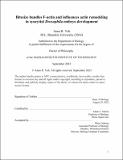Bitesize bundles F-actin and influences actin remodeling in syncytial Drosophila embryo development
Author(s)
Yeh, Anna R.
DownloadThesis PDF (5.845Mb)
Advisor
Martin, Adam C.
Terms of use
Metadata
Show full item recordAbstract
Actin networks undergo rearrangements that influence cell and tissue shape. Actin assembly and organization is regulated in space and time by a host of actin binding proteins. Despite the importance of these processes, their regulation is not well understood. The Drosophila Synaptotagmin-like protein, Bitesize (Btsz), organizes actin at epithelial cell apical junctions in a manner that depends on its interaction with the actin-binding protein, Moesin. Here, I show that Btsz functions in actin reorganization at earlier, syncytial stages of Drosophila embryo development. Btsz was required for the formation of stable pseudo-cleavage furrows that prevented spindle collisions and nuclear fallout prior to cellularization. While previous studies focused on Btsz isoforms containing the Moesin Binding Domain (MBD), we found that isoforms lacking the MBD also function in actin remodeling. Consistent with this, we found that the C-terminal half of BtszB cooperatively bound and bundled F-actin with micromolar affinity, suggesting a direct mechanism for Synaptotagmin-like proteins regulating actin organization during animal development. This is the first work to show that a Slp can bind and bundle F-actin and provides additional context to past work for how Btsz is regulating actin networks.
Date issued
2023-09Department
Massachusetts Institute of Technology. Department of BiologyPublisher
Massachusetts Institute of Technology